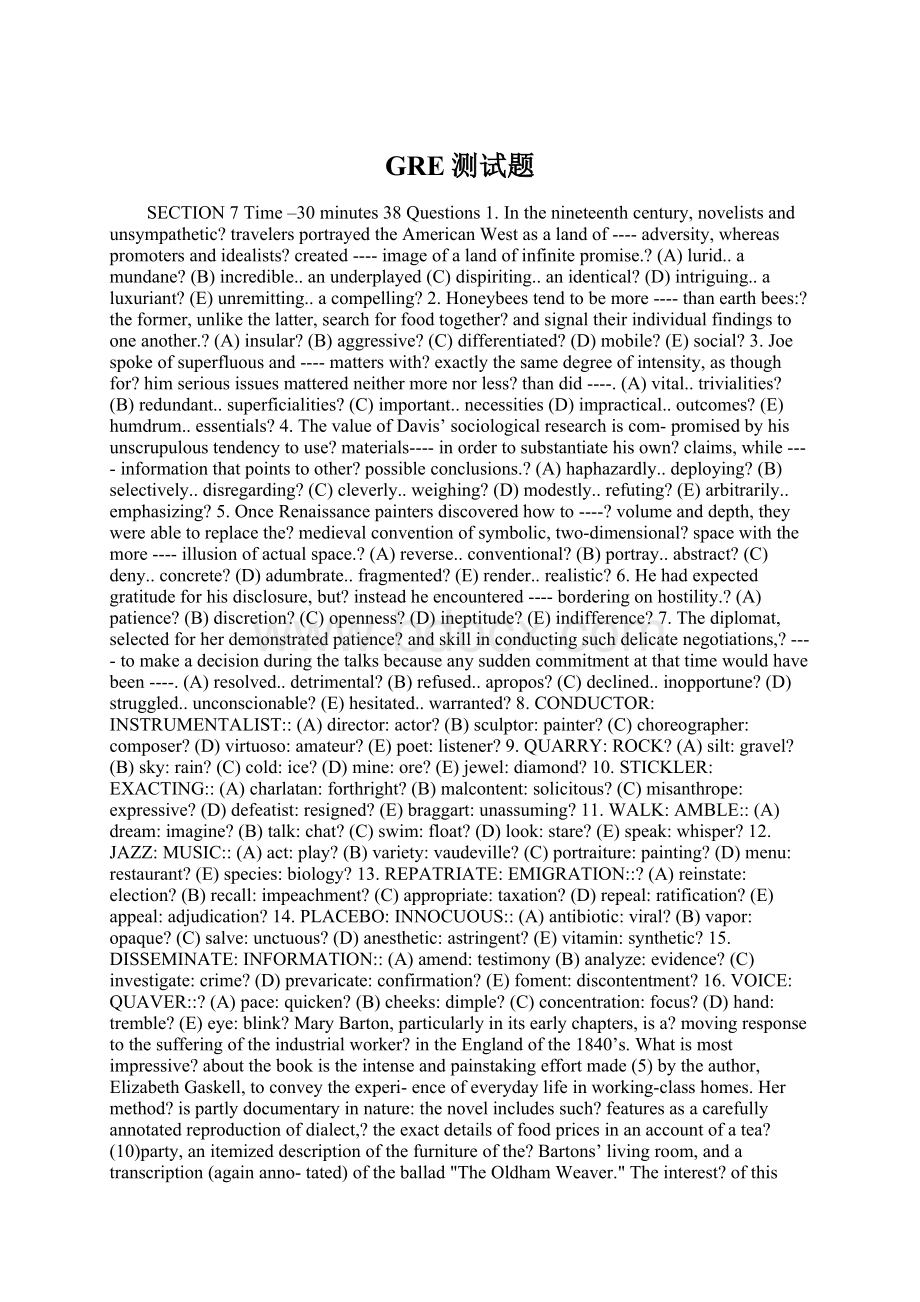GRE测试题.docx
《GRE测试题.docx》由会员分享,可在线阅读,更多相关《GRE测试题.docx(3页珍藏版)》请在冰豆网上搜索。

GRE测试题
SECTION7Time–30minutes38Questions1.Inthenineteenthcentury,novelistsandunsympathetic?
travelersportrayedtheAmericanWestasalandof----adversity,whereaspromotersandidealists?
created----imageofalandofinfinitepromise.?
(A)lurid..amundane?
(B)incredible..anunderplayed(C)dispiriting..anidentical?
(D)intriguing..aluxuriant?
(E)unremitting..acompelling?
2.Honeybeestendtobemore----thanearthbees:
?
theformer,unlikethelatter,searchforfoodtogether?
andsignaltheirindividualfindingstooneanother.?
(A)insular?
(B)aggressive?
(C)differentiated?
(D)mobile?
(E)social?
3.Joespokeofsuperfluousand----matterswith?
exactlythesamedegreeofintensity,asthoughfor?
himseriousissuesmatteredneithermorenorless?
thandid----.(A)vital..trivialities?
(B)redundant..superficialities?
(C)important..necessities(D)impractical..outcomes?
(E)humdrum..essentials?
4.ThevalueofDavis’sociologicalresearchiscom-promisedbyhisunscrupuloustendencytouse?
materials----inordertosubstantiatehisown?
claims,while----informationthatpointstoother?
possibleconclusions.?
(A)haphazardly..deploying?
(B)selectively..disregarding?
(C)cleverly..weighing?
(D)modestly..refuting?
(E)arbitrarily..emphasizing?
5.OnceRenaissancepaintersdiscoveredhowto----?
volumeanddepth,theywereabletoreplacethe?
medievalconventionofsymbolic,two-dimensional?
spacewiththemore----illusionofactualspace.?
(A)reverse..conventional?
(B)portray..abstract?
(C)deny..concrete?
(D)adumbrate..fragmented?
(E)render..realistic?
6.Hehadexpectedgratitudeforhisdisclosure,but?
insteadheencountered----borderingonhostility.?
(A)patience?
(B)discretion?
(C)openness?
(D)ineptitude?
(E)indifference?
7.Thediplomat,selectedforherdemonstratedpatience?
andskillinconductingsuchdelicatenegotiations,?
----tomakeadecisionduringthetalksbecauseanysuddencommitmentatthattimewouldhavebeen----.(A)resolved..detrimental?
(B)refused..apropos?
(C)declined..inopportune?
(D)struggled..unconscionable?
(E)hesitated..warranted?
8.CONDUCTOR:
INSTRUMENTALIST:
:
(A)director:
actor?
(B)sculptor:
painter?
(C)choreographer:
composer?
(D)virtuoso:
amateur?
(E)poet:
listener?
9.QUARRY:
ROCK?
(A)silt:
gravel?
(B)sky:
rain?
(C)cold:
ice?
(D)mine:
ore?
(E)jewel:
diamond?
10.STICKLER:
EXACTING:
:
(A)charlatan:
forthright?
(B)malcontent:
solicitous?
(C)misanthrope:
expressive?
(D)defeatist:
resigned?
(E)braggart:
unassuming?
11.WALK:
AMBLE:
:
(A)dream:
imagine?
(B)talk:
chat?
(C)swim:
float?
(D)look:
stare?
(E)speak:
whisper?
12.JAZZ:
MUSIC:
:
(A)act:
play?
(B)variety:
vaudeville?
(C)portraiture:
painting?
(D)menu:
restaurant?
(E)species:
biology?
13.REPATRIATE:
EMIGRATION:
:
?
(A)reinstate:
election?
(B)recall:
impeachment?
(C)appropriate:
taxation?
(D)repeal:
ratification?
(E)appeal:
adjudication?
14.PLACEBO:
INNOCUOUS:
:
(A)antibiotic:
viral?
(B)vapor:
opaque?
(C)salve:
unctuous?
(D)anesthetic:
astringent?
(E)vitamin:
synthetic?
15.DISSEMINATE:
INFORMATION:
:
(A)amend:
testimony(B)analyze:
evidence?
(C)investigate:
crime?
(D)prevaricate:
confirmation?
(E)foment:
discontentment?
16.VOICE:
QUAVER:
:
?
(A)pace:
quicken?
(B)cheeks:
dimple?
(C)concentration:
focus?
(D)hand:
tremble?
(E)eye:
blink?
MaryBarton,particularlyinitsearlychapters,isa?
movingresponsetothesufferingoftheindustrialworker?
intheEnglandofthe1840’s.Whatismostimpressive?
aboutthebookistheintenseandpainstakingeffortmade(5)bytheauthor,ElizabethGaskell,toconveytheexperi-enceofeverydaylifeinworking-classhomes.Hermethod?
ispartlydocumentaryinnature:
thenovelincludessuch?
featuresasacarefullyannotatedreproductionofdialect,?
theexactdetailsoffoodpricesinanaccountofatea?
(10)party,anitemizeddescriptionofthefurnitureofthe?
Bartons’livingroom,andatranscription(againanno-tated)oftheballad"TheOldhamWeaver."Theinterest?
ofthisrecordisconsiderable,eventhoughthemethod?
hasaslightlydistancingeffect.(15)Asamemberofthemiddleclass,Gaskellcould?
hardlyhelpapproachingworking-classlifeasanoutside?
observerandareporter,andthereaderofthenovelis?
alwaysconsciousofthisfact.Butthereisgenuineimag-inativere-creationinheraccountsofthewalkinGreen?
(20)HeysFields,ofteaattheBartons’house,andofJohn?
Bartonandhisfriend’sdiscoveryofthestarvingfamily?
inthecellarinthechapter"PovertyandDeath."Indeed,?
forasimilarlyconvincingre-creationofsuchfamilies’?
emotionsandresponses(whicharemorecrucialthanthe?
(25)materialdetailsonwhichthemerereporterisapttocon-centrate),theEnglishnovelhadtowait60yearsforthe?
earlywritingofD.H.Lawrence.IfGaskellneverquite?
conveysthesenseoffullparticipationthatwould?
completelyauthenticatethisaspectofMaryBarton,she?
(30)stillbringstothesescenesanintuitiverecognitionof?
feelingsthathasitsownsufficientconviction.Thechapter"OldAlice’sHistory"brilliantlydrama-tizesthesituationofthatearlygenerationofworkers?
broughtfromthevillagesandthecountrysidetothe?
(35)urbanindustrialcenters.TheaccountofJobLegh,the?
weaverandnaturalistwhoisdevotedtothestudyof?
biology,vividlyembodiesonekindofresponsetoan?
urbanindustrialenvironment:
anaffinityforliving?
thingsthathardens,byitsverycontrastwithitsenviron-(40)ment,intoakindofcrankiness.Theearlychapters―aboutfactoryworkerswalkingoutinspringintoGreen?
HeysFields;aboutAliceWilson,rememberinginher?
cellarthetwig-gatheringforbroomsinthenativevillage?
thatshewillneveragainsee;aboutJobLegh,intenton?
(45)hisimpaledinsects―capturethecharacteristicresponses?
ofagenerationtothenewandcrushingexperienceof?
industrialism.Theotherearlychapterseloquentlypor-traythedevelopmentoftheinstinctivecooperationwith?
eachotherthatwasalreadybecominganimportant?
traditionamongworkers.ofthefollowingbestdescribestheauthor’s?
attitudetowardGaskell’suseofthemethodof?
documentaryrecordinMaryBarton?
(A)Uncriticalenthusiasm?
(B)Unresolvedambivalence?
(C)Qualifiedapproval?
(D)Resignedacceptance?
(E)Mildirritation?
18.Accordingtothepassage,MaryBartonandthe?
earlynovelsofD.H.Lawrencesharewhichofthe?
following(A)Depictionofthefeelingsofworking-classfamilies(B)Documentaryobjectivityaboutworking-class?
circumstances?
(C)Richlydetaileddescriptionofworking-class?
adjustmenttourbanlife(D)Imaginativelystructuredplotsaboutworking-classcharacters?
(E)Experimentalprosestylebasedonworking-classdialect?
19.Whichofthefollowingismostcloselyanalogousto?
JobLeghinMaryBarton,asthatcharacteris?
describedinthepassage(A)Anentomologistwhocollectedbutterfliesasa?
child?
(B)Asmall-townattorneywhosehobbyisnature?
photography(C)Ayoungmanwholeaveshisfamily’sdairy?
farmtostarthisownbusiness?
(D)Acitydwellerwhoraisesexoticplantsonthe?
roofofhisapartmentbuilding?
(E)Aunionorganizerwhoworksinatextilemill?
underdangerousconditions?
20.Itcanbeinferredfromexamplesgiveninthelast?
paragraphofthepassagethatwhichofthefollowing?
waspartof"thenewandcrushingexperienceof?
industrialism"(lines46-47)formanymembersof?
theEnglishworkingclassinthenineteenthcentury(A)Extortionatefoodprices?
(B)Geographicaldisplacement?
(C)Hazardousworkingconditions?
(D)Alienationfromfellowworkers?
(E)Dissolutionoffamilyties?
21.Itcanbeinferredthattheauthorofthepassage?
believesthatMaryBartonmighthavebeenan?
evenbetternovelifGaskellhad?
(A)concentratedontheemotionsofasingle?
character?
(B)madenoattempttore-createexperiencesof?
whichshehadnofirsthandknowledge?
(C)madenoattempttoreproduceworking-class?
dialects?
(D)grownupinanindustrialcity?
(E)managedtotranscendherpositionasanoutsider?
22.Whichofthefollowingphrasescouldbestbe?
substitutedforthephrase"thisaspectofMary?
Barton"inline29withoutchangingthemeaning?
ofthepassageasawhole(A)thematerialdetailsinanurbanworking-class?
environment?
(B)theinfluenceofMaryBartononlawrence’s?
earlywork(C)theplaceofMaryBartoninthedevelopment?
oftheEnglishnovel?
(D)theextentofthepovertyandphysical?
sufferingamongEngland’sindustrial?
workersinthe1840’s.(E)theportrayaloftheparticularfeelingsand?
responsesofworking-classcharacters?
23.TheauthorofthepassagedescribesMaryBarton?
aseachofthefollowingEXCEPT?
(A)insightful?
(B)meticulous?
(C)vivid?
(D)poignant?
(E)lyrical?
Asofthelate1980’s.neithertheoristsnorlarge-scalecomputerclimatemodelscouldaccuratelypredict?
whethercloudsystemswouldhelporhurtawarming?
globe.Somestudiessuggestedthatafourpercent?
(5)increaseinstratocumuluscloudsovertheoceancould?
compensateforadoublinginatmosphericcarbondiox-ide,preventingapotentiallydisastrousplanetwidetemp-eratureincrease.Ontheotherhand,anincreaseincirrus?
cloudscouldincreaseglobalwarming.(10)Thatcloudsrepresentedtheweakestelementincli-matemodelswasillustratedbyastudyoffourteensuch?
models.Comparingclimateforecastsforaworldwith?
doublethecurrentamountofcarbondioxide,researchers?
foundthatthemodelsagreedquitewellifcloudswere?
(15)notincluded.Butwhencloudswereincorporated,awide?
rangeofforecastswasproduced.Withsuchdiscrepanciesplaguingthemodels,scientistscouldnoteasilypredict?
howquicklytheworld’sclimatewouldchange,norcould?
theytellwhichregionswouldfacedustierdr